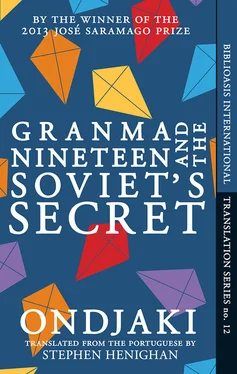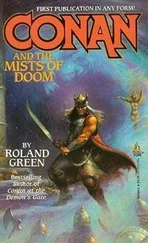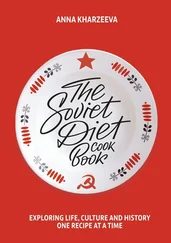It took me some time to learn by heart this complicated sentence, and even the almost Cuban accent with which he said “hot,” prior to withdrawing before the amazement of everyone and the dropped jaw of the Comrade Baker.
“Don’t you ever get tired of always saying the same thing?”
“The world has not yet learned the simplest of truths. La luna appears every month and we still haven’t learned to draw its shape. The more we…”
Sea Foam extended his hand and the Comrade Baker was unable to reject the gesture. He gripped the stamp he used to stamp the bread ration card, and slowly stamped the lunatic’s left hand.
“So that no one may say that I did not report for the morning call. Aren’t we going to sing the national anthem today, Comrades?”
If everyone remained silent and avoided looking at him, Sea Foam, with the stamp on his left hand and very slowly fanning the whip in his right, withdrew and went to take an early morning swim on the prohibited section of Bishop’s Beach. The Soviet guards, with their skin reddened by the hot sun and their dark blue military uniforms, no longer prevented him from swimming there every morning.
“One day the Mausoleum’s gonna fly,” Sea Foam kept saying, “and it’s gonna take all the blue ants with it…”
In their half-spitting tongue, the Soviets laughed, not understanding even a single internationalist comma or word. They became redder, they adjusted their berets and shook their blue uniforms, laughing at the crazy guy, imitating the herky-jerky gestures with which he sank into the water, without knowing that they were the blue ants and that Sea Foam wanted them to go away on a flight that took off from the Mausoleum construction site.
When Madalena returned from the bakery, she brought the bag of warm bread in one hand and the stone in the other. She hid the stone behind the flowerpot on the veranda, dusted off her hand and left the bread on the table.
“I shall always long for bread. It’s hard that coffins are such narrow places.”
“Always talking about coffins and death, Catarina. Really!” Granma Agnette didn’t like this.
“Death is our next home, Agnette.”
Seated on the veranda, I liked to play the game of looking at the white clouds dancing in the sky as the wind pushed them.
In school they taught that the wind was invisible, and in a way it is, but, without wanting to seem crazy like Sea Foam, there are times when I find that, just from how the clouds fly, it almost becomes possible to see where the wind is coming from and, above all, where it’s going. If you pay close attention, it’s obvious that the wind can’t like riding through the sky alone because it always lifts the dust, bends the trees, puffs out the leaves and drags the clouds away. The wind must have a house in the far-away, and it’s always trying to carry the clouds home with it. But this is something I keep to myself without telling anyone because other children might call me a nutcase and the elders could want to give me medicine to see whether I’m all right in my head.
When I had my eyes closed, I played another game. It was called “Guessing noises” and it was nothing more than this: keeping my eyes closed and listening to the tiny noises in Granma Agnette’s garden. The steps of Granma Maria, who was Charlita’s granma, in the yard next door, the scuffing of her sandals and the momentum of her body could tell me whether or not she had the bowl of kitaba on her head. The clinking of the keys that hung from Comrade Gudafterov’s belt could tell me whether he was going to drive a tractor, open the large front gate or go to the pantry where he had hidden a bottle of vodka. The sound of Granma Catarina’s shoes let me know how many steps she had climbed on her way to the window the first time she did this in the morning—“I’m going to see if I left the window open”—at an hour when she still had the strength to go upstairs quickly; a different sound could mean that she had turned left and entered the bathroom. The wet sound of a watery rag being swirled around meant that Granma Agnette had already tidied up the kitchen and Madalena was on her knees cleaning the floor, which she did before going outside to shake out the carpets and give corn to the chickens; or, if there was no corn, it might be leftover dried breadcrumbs. Later she might sweep the yard of the leaves that fell from the fig tree, and only at the end would she clean the parrots’ cage in a strange manner, for when Madalena Kamussekele was near, the parrots stayed peaceful and refrained from speaking nonsense. The last of the noises, the one, to tell the truth, I liked best, was the most attractive and most difficult of them all: to stay very silent, to try to breathe slowly with my eyes completely closed, in order to listen, through the tiny openings in the low wall, to the sound of the slugs that sat on the stones in the garden or climbed the large leaves that looked like enormous highways for slugs to scale.
“How many slugs?” Madalena knew my game. “Without opening your eyes, you cheater.”
“I don’t need to cheat.”
“How many?”
“Three.”
“You’re wrong! There are four of them.”
“It can’t be!”
But it was. A smaller one on the tip of the leaf and lacking the slightest trail of drool had made me get the number wrong.
“It doesn’t count, the little one didn’t move. There’s no way I could know.”
“It doesn’t matter. You’re wrong.” Madalena went happily back to the yard.
3.14 was at the front gate, laughing at our craziness.
“What are you guys doin’?”
“Nothing.”
“Nothing? It’s ‘nothing’ when the two of you talk about a bunch of slugs climbing up a leaf?”
“Hey! Don’t shoot your mouth off. What’s happening?”
“What’s happening is that your Granma’s house has tons of light and we’re stuck and can’t even watch the soap opera. They’re sayin’ your Granma’s got pull with the Soviet tupariov. Maybe they’re even lovebirds.”
“Stop that. I’m gonna smash your face in!”
“Cool it, it’s just stuff I heard. But you guys had light yesterday, that part’s true.”
“I’d like to talk to you about that.”
“Are we gonna connect a cable from your Granma’s house? That would be awesome.”
“No. We’re going to cut the cable.”
“What do you mean?”
“If the other houses don’t have light, the best thing is not to have it. It’s just gonna cause a scrap. On top of that, the TV’s on the blink and it’s useless for watching soap operas. Do you know which cable it is?”
“I know. Aren’t you gonna catch hell from your Granma?”
“Only if she finds out. Are you a little tattletale like Charlita? Eh?”
This was the best way to do it. 3.14 hated being called a tattletale, or being compared to girls.
“We just need a pair of wire cutters.”
“I think Madalena could help us.”
“Is she gonna ask for something?”
“Like what?”
“Like something in exchange for the wire cutters.”
“Let’s go find out.”
In the yard the parrots were whistling or speaking nonsense words that Granma didn’t like at all. They could utter combinations of nonsense, some Angolan sentences mixed with Russian, and even a few words of Cuban. For example, they said, “ cabrón, ” a lot, “ que te parió, ” or another phrase that they had learned from the movies — I think it was pronounced “fak iu”—which you couldn’t even repeat.
One parrot, the one with very light ash-coloured feathers, was called Just Parrot, and the other one was called His Name, as a result of a tale that isn’t worth telling right now. This His Name was an old parrot whose age nobody knew. His wings had been clipped and his whole body singed, and he was brought to our yard by André, a commando who had picked up the parrot after some nerve-wracking battles south of Kwanza-Sul Province.
Читать дальше












